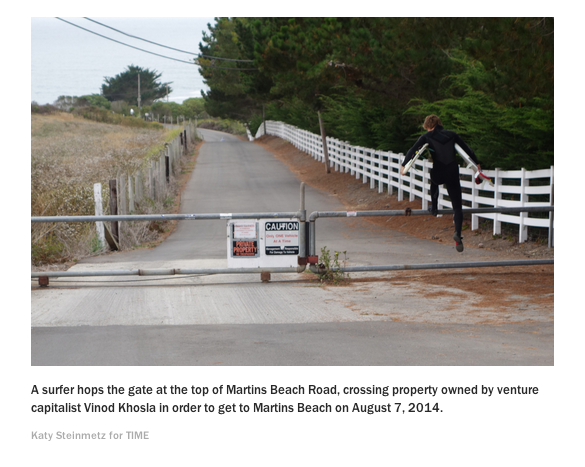The controversy between oceanfront property owners and the public rages on in CA.
In this case, Vinod Khosla (co-founder of Sun Microsystems) took a stand against the Surfrider Foundation over access to the beach across his private property. Khosla does not have a home or plan to build one on the property–so privacy is not his chief issue–but he wants a resolution. He had been spending money on insurance and upkeep of the passageway.
Khosla lost this round of the battle. The latest ruling by a San Mateo Superior Court requires Khosla to seek a permit from the California Coastal Commission before closing the gate to the beach. He will also be requited to "consult with the community to determine changes to the property and public access to the beach." (Silicon Valley billionaire Vinod Khosla forced to allow access to the beach he had blocked?)
Khosla may appeal. His side:
"[Khosla] said that he tried to meet with the Commission several times, and that it was unreasonable to expect him to pay exorbitant fees to keep the beach open to the public. He claims to have paid between $500,000 and $600,000 a year in costs for maintenance, liability insurance, and infrastructure, among other expenses." (Silicon Valley billionaire Vinod Khosla forced to allow access to the beach he had blocked?)
How do you think conflict between property owners' rights and beach goers' rights should be resolved in this case? In general?

Surfers Beat Billionaire in Landmark California Beach Case
By Katy Steinmetz at TIME
The latest ruling in the ongoing battle over a northern California surf spot is a blow to venture capitalist Vinod Khosla
A California court issued a milestone ruling Sept. 24 that may restore public access to a beach that requires traveling across privately owned land, the latest turn in a multi-year legal frenzy that has pitted the surfers who cross the property against the billionaire who owns it.
At the center of the controversy is a low-slung metal gate that sits at the top of Martins Beach Road, an offshoot of the Pacific Coast Highway that is the only way to access Martins Beach from dry land. The road snakes across 53 acres that Khosla bought for $32.5 million in 2008. For two years, his property manager allowed the public to occasionally visit a stretch of sand where locals have gone smelt-fishing and surfing and picnicking for decades. But Khosla allowed the gate to be closed permanently in 2010 after his property manager received a letter from the county demanding that it stay open every day.
The conflict comes at a time when an influx of tech wealth has sharpened class tension in northern California. “[Kholsa] believes that he can find a way to use his wealth and power to strong-arm the situation,” says Chad Nelsen, environmental director of the Surfrider Foundation.
Khosla doesn’t own a home on the land and says he has no plans to build one. The decision to shut off access to the road was a way to take a stand about what he felt were his basic rights. “This is a case about private property,” Khosla told TIME in an email. “We need to assert our rights and get the courts to clarify them.”
Khosla’s lawyers say they are considering appealing the verdict. “We will continue to seek protection of the constitutional rights of private property owners that are guaranteed by the U.S. and California Constitutions and that have long been upheld by the United States and California Supreme Courts,” his attorneys said in a statement.
Surfrider’s argument rested on a seemingly bureaucratic detail. The organization claimed that under the 1976 Coastal Act, which gave a statewide Coastal Commission jurisdiction over beachfront land, Khosla needed to apply for a development permit in order to close the gate. The commission will often only grant development permits, typically to build a home or another structure, if the public gets an established right of way in return.
“Because they’re in charge of beach development, they’re allowed to do this quid pro quo,” says Arthur McEvoy, a professor at Southwestern Law School in Los Angeles. “They can ask you in trade to dedicate a little easement, if the development threatens to impede public access.”
The tricky matter is that while beaches are widely considered public, people don’t necessarily have a right to cross private property to get there. Cases such as this one set precedents that resonate up and down California’s 840 miles of coastline.
[…]
“Our culture abhors private beaches, and generally speaking our law abhors private beaches as well,” McEvoy said. “And any landowner is going to want to keep people away from their beach.”
[emphasis mine]
Continue reading: Surfers Beat Billionaire in Landmark California Beach Case | TIME.



